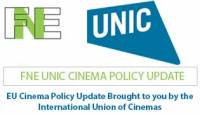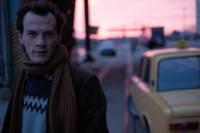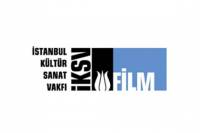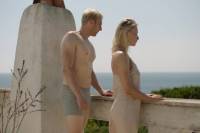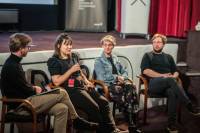WARSAW: FNE has teamed up with the Brussels based team of the International Union of Cinemas (UNIC) to bring you regular updates on EU cinema policies that impact all industry professionals across Europe. Click here for FNE UNIC EU Cinema Policy Update.
Ukraine
16/03: CULT Exchange of Views on "The Russian War Against Ukraine" – European Parliament
Given the dramatic situation in Ukraine, the CULT Committee put a thematic focus on Russia’s aggression in its forthcoming committee meeting on 15 March 2022.
Cultural and creative industries and AI
16/03: Commission publishes two studies to map the challenges and opportunities for cultural and creative sectors in the digital decade – European Commission
Both studies aim to provide creative entrepreneurs, academics, national policy makers as well as EU policy makers with concrete ideas as well as avenues for further exploration.
Digital Services Act
21/03: IMCO Digital Services Act – European Parliament
The third trilogue on the DSA took place on 15.03.2022 in the Council's premises. The EP Rapporteur, Christel Schaldemose (S&D), said: the DSA has been drafted and now negotiated in the context of two major crises: the global pandemic and now the Russian invasion of Ukraine. The crises have brought the shortcomings of the current framework to light, but they have also made it clear that we must not forget who we are and defend our values in the DSA.
Digital Markets Act
25/03: Digital Markets Act (DMA): agreement between the Council and the European Parliament – European Council
The Council and the Parliament today reached a provisional political agreement on the Digital Markets Act (DMA), which aims to make the digital sector fairer and more competitive. Final technical work will make it possible to finalise the text in the coming days.
25/03: Digital Markets Act: Commission welcomes political agreement on rules to ensure fair and open digital markets – European Commission
The Commission welcomes the swift political agreement reached yesterday between the European Parliament and EU Member States on the Digital Markets Act (DMA). The regulation, agreed in slightly more than a year after it was proposed, is among the first initiatives of its kind to comprehensively regulate the gatekeeper power of the largest digital companies.
NextGenerationEU
22/03: NextGenerationEU: European Commission completes the second successful bond issuance in 2022 – European Commission
The European Commission has today raised a further €10 billion in NextGenerationEU funds through its second bond syndication of 2022. The 10-year bond, due on 06 July 2032, brings the total financing raised under the programme to €91 billion. This placement will continue to support Europe's economic recovery under the Recovery and Resilience Facility and the other EU-budget programmes funded through NextGenerationEU.
European Council
25/03: Charles Michel re-elected president of the European Council – Council of the EU
The European Council re-elected Charles Michel as its president for a second term of two and a half years, from 1 June 2022 to 30 November 2024. Charles Michel was also re-appointed as President of the Euro Summit for the same period.
Events:
April 2022 - Adoption of Council conclusions on building a European Strategy for the Cultural and Creative Industries
5-6 April - UKCA Conference
25-28 April - CinemaCon 2022
20-23 April - UNIC programme in Cannes, more details to follow
20 May - EFF in Cannes - location and topic tbc
21 May - European Audiovisual Observatory conference “Circulation of films – is there enough availability?”
20-23 June - CineEurope 2022
VILNIUS: Acclaimed Lithuanian documentary film director Mantas Kvedaravičius (45) has been killed in Mariupol, the very Ukrainian town which he documented in Mariupolis.
VILNIUS: The Serbian documentary Rampart directed by Marko Grba Singh has been awarded Best European Debut at the Vilnius Kino Pavasaris International Film Festival, which took place 24 March - 3 April 2022.
BUDAPEST: The Hungarian spy drama series The Informant / A besúgó, written and directed by Bálint Szentgyörgyi, was released in 61 countries worldwide on HBO Max on 1 April 2022.
ISTANBUL: The Istanbul International Film Festival has announced the programme of its 41st edition, which will take place 8-19 April 2022.
WIESBADEN: Fourteen titles have been selected for the International Competition of the 22nd edition of goEast – Festival of Central and Eastern European Film, hosted by DFF – Deutsches Filminstitut & Filmmuseum from 19 to 25 April in Wiesbaden and the Rhine-Main region.
The East Doc Platform Award went to the Polish project The World is not (a) Mine by Natalia Koniarz about inhabitants working in inhuman conditions mining metals on the Cerro Rico mountain.
Watch FNE Visegrad Panel Podcast: Festivals 2.0: How to Approach Audience in Post-COVID Era
Czech Republic 01-04-2022To watch the panel discussion click HERE.
The Panel discussion Festivals 2.0: How to Approach the Audience in the Post-COVID Era, organised by the Institute of Documentary Film in cooperation with Film New Europe and One World Film Festival, and supported by the International Visegrad Fund, was held on 30 March 2022 at 5:30 pm (CET) at Kino 35 (French Institute in Prague) within the East Doc Platform.
Presenting the Heart of the Festival: goEast's Competition for Central and Eastern European Fiction and Documentary Films
Festivals 31-03-2022Cinema's Dilemma Between War and Cultural Boycotts // Dreams, Dramas and Hard Reality – The goEast Competition // Opening Film: THE BALCONY MOVIE // goEast Bioscop: Feminism, Family and Film Noir // Still Time to Register for Accreditation! // Press Conference on Wednesday, 13 April at 11 am at Wiesbaden's Caligari FilmBühne
Wiesbaden/Frankfurt, 31 March 2022
There are only three weeks remaining until the opening of the 22nd edition of goEast – Festival of Central and Eastern European Film, hosted by DFF – Deutsches Filminstitut & Filmmuseum from 19 to 25 April in Wiesbaden and the Rhine-Main region. A portion of the programme will also be made available online in co-operation with VoD platform Filmwerte.
In these times of war and cultural boycotts, a scant few weeks before the beginning of the festival, goEast wishes to further articulate its position regarding the blanket ban of Russian filmmakers called for by Ukrainian institutions. The festival organisers at goEast have engaged in lengthy discussions about how to approach this demand for a boycott in light of the current state of war and have decided to search for a compromise: In co-operation with independent filmmakers, representatives of various Ukrainian institutions and festivals, goEast is hosting a panel on Saturday, 23 April, 6 p.m. at Caligari FilmBühne, to be moderated by festival director Heleen Gerritsen, where the Ukrainian participants discuss the boycott from a Ukrainian point of view and explain their motives and aims. In total, three Russian films previously selected for the programme which received state funding or were financed by foundations connected to the Russian government, i.e., the president’s office, will not be shown. The films HOUSE ARREST (Delo, Russia/ Germany/ Canada, 2021) by Alexei German Jr. and THE DANUBE (Dunay, Russia, 2021) by Lyubov Mulmenko have been withdrawn by the filmmakers. As a result, this year's Competition section will only feature 14 films. There will also be an absent production in the Bioscop section: director Ekaterina Selenkina has withdrawn her film DETOURS (Obkhodniye puti, Russia, 2021) from the programme. Statements from the Russian filmmakers can be read on the goEast website. The films will not be replaced – during a time of war, having holes in the programme does not seem inappropriate.
Here is a statement from the goEast selection committee:
“We have been expounding the problems of the political developments in Russia for years – militarization, a depletion of constitutionality, the expropriation of human rights, the public acceptance and propaganda of Stalinism, oligarchy etc. and were a forum for oppositional dissident voices in particular. As long as the Russian Federation continues this aggressive war against the Ukraine violating international and human law, the selection panel is supporting the decision of the festival not to screen State-financed Russian movies. Business as usual is not possible. For an extensive cultural dialogue, the weapons need to fall quiet first. Hearing the voices of Ukrainian filmmakers needs to be the priority.”
Dreams, Dramas and Hard Reality – The goEast Competition
With the centrepiece of the festival, the Competition section, goEast offers a broad audience the opportunity to experience highlights from contemporary Central and Eastern European cinema. A five-member international jury presides over the presentation of three awards with a total value of 21,500 euros, while a jury representing FIPRESCI presents two International Film Critics' Awards. An especially coveted trophy here: the "Golden Lily", the main prize in the goEast Competition, endowed with 10,000 euros in prize money.
Dreams and the will to live a self-determined life are the thread connecting several films within the festival programme. In the Kosovar Competition entry VERA DREAMS OF THE SEA (Vera Andrron Detin, Kosovo/ Albania/ North Macedonia, 2021) from director Kaltrina Krasniqi, main character Vera finds her world turned upside down when her husband commits suicide, and must stubbornly fight for her rights as a patriarchal village community attempts to nullify her inheritance. In the Hungarian fiction feature GENTLE (Szelíd, Hungary/ Germany, 2022) by directorial duo Anna Nemes and László Csuja, bodybuilder Edina is forced to ask herself what her dream actually is and how much she is willing to sacrifice to achieve it, as she rebels against her oppressive coach/boyfriend while having to take care not to lose sight of her goal. The Armenian documentary film 5 DREAMERS AND A HORSE (5 Yerazoghnery Yev Dzin, Armenia/ Germany/ Switzerland/ Georgia/ Denmark, 2022) follows its protagonists as they attempt to live their dreams, which are as different from one another as the individuals themselves. Directors Vahagn Khachatryan and Aren Malakyan have created a poetic film full of human warmth. The dream motif running through the documentary film MARA (France/Belarus, 2022) by Belarusian director Sasha Kulak is developed in an equally poetic manner. Amidst the mass demonstrations against the Lukashenka dictatorship, a figure can be seen roaming around – at times wearing a plaster mask and crown, or with a long, red train trailing behind: Mara manifests in the protest colours of the Belarusian revolution (the name of the mythic figure, who haunts humans with nightmares, means something like "dream" or "hope" in the Old East Slavic language). For her part, 14-year-old Nastya could use a little hope in BONEY PILES (Terykony, Ukraine, 2022), a documentary portrait of wartime life. For as long as she can remember, war has been raging near her village in Eastern Ukraine, and, still, she dreams of having a normal childhood. Taras Tomenko's film makes viewers painfully aware of the nature of reality in Eastern Ukraine even before 24 February 2022.
Relationship dynamics are also a subject that rears its head repeatedly in the entries to the Competition. The family drama KLONDIKE (Ukraine/ Turkey, 2022) is also set at the front, in the middle of the war on the Ukrainian-Russian border. Ukrainian director Maryna Er Gorbach's film revolves around a couple expecting their first child that is nevertheless reluctant to leave the war zone. The situation is altogether different for the couple at the centre of the Polish production SILENT LAND (Cicha Ziemia, Poland/ Italy/ Czech Republic, 2021) by director Aga Woszczyńska. Here, two well-groomed vacationers witness a deadly accident without intervening to help and proceed to become entangled in their own web of lies. With its intense imagery, the film reveals the ugly countenance of the affluent society that lurks beneath the ostensibly perfect facade. In the Serbian drama AS FAR AS I CAN WALK (Strahinja Banović, Serbia/ Luxemburg/ France/ Bulgaria/ Lithuania, 2021), a married couple from Ghana is fighting for the right to live happily ever after in Europe. Director Stefan Arsenijević stages the love story between two refugees with clever references to the Serbian national hero Strahinja Banović. NUUCCHA (Russia, 2021), a Yakutian colonial drama from director Vladimir Munkuev, is set in late 19th century Siberia. In the film, an involuntarily childless indigenous couple is forced to take in a Russian convict, who eventually proves to be anything but a respectful house guest.
In the Lithuanian Competition entry PILGRIMS (Pilgrimai, Lithuania, 2021), a crime thriller by Laurynas Bareiša, two individuals set off on a road trip, a journey that starts out as an attempt to avenge an unsolved murder and soon reveals itself to be a special type of grief therapy. The Bulgarian film JANUARY (Yanuari, Bulgaria/ Luxemburg/ Portugal, 2021) by Andrey M. Paounov delivers striking visuals: in black-and-white and colour, the film employs thriller and horror tropes against the backdrop of a decaying hotel ruin to tell a story of those who live way out in the countryside and seem to have been forgotten by society. Almost forgotten but of immense importance are the workers in the documentary film COTTON100% (Uzbekistan/ Germany, 2021) by Uzbek director Mikhail Borodin. Two impressive women are fighting for the basic civil rights of labourers behind the coveted cotton harvest, who are often recruited by force. In the observational documentary WHERE ARE WE HEADED? (Belarus/Russia, 2021), Belarusian filmmaker Ruslan Fedotov takes a look at the Moscow Metro system as a mirror for Russian society. To the rhythm of the subway trains, beautiful and unsettling images play out. The truth revealed by the film BABI YAR. CONTEXT (Babi Yar. Kontekst, Netherlands/Ukraine, 2021) is also deeply unsettling. In one of the worst massacres in history, ten of thousands of Jews were murdered in cold blood in 1941 by a German special unit in Kiev. Based on meticulous research and featuring a wealth of archival materials, Sergei Loznitsa tells a horrific story of war, death, destruction and grief.
goEast Opening Film – Warm-Hearted Encounters at a Distance in THE BALCONY MOVIE
With THE BALCONY MOVIE (Film balkonowy, Poland, 2021), Polish documentary filmmaker Paweł Łoziński undertakes a bold experiment. Poised on his own balcony, he interacts with passers-by on the path below and captures their wildly differing personal stories on camera. Through this method, over the course of two years a thoroughly static situation gives rise to a variety of perspectives, life visions and realities that abound in the world and, more specifically, today's Poland. As THE BALCONY MOVIE proves, Paweł Łoziński is a master of innovative approaches to getting close to his subjects, one who repeatedly manages to create intimate and emotional portraits. In a master class in the scope of the East-West Talent Lab, the director will share his experiences as a filmmaker and offer insight into his working method.
Feminism, Family and Film Noir – goEast Bioscop
Whereas the films of the Competition are generally celebrating some type of premiere at goEast, that is not necessarily a priority when it comes to the productions featured in the festival's Bioscop section. These seven films are meant to enable cinemagoers to experience a panoramic view of all that contemporary Central and Eastern European cinema has to offer in 2022. In WOMEN DO CRY (Bulgaria, 2021), a drama from Bulgarian co-directors Mina Mileva and Vesela Kazakova, three sisters are fighting for equal treatment and recognition in very different situations within a modern-day Bulgaria still plagued by misogyny. The film WET SAND (Switzerland/Georgia, 2021) also focuses on a combative female character, Moe, who returns to the hometown of her deceased grandfather, where she encounters a slew of secrets and rampant homophobia, which she refuses to accept. Georgian director Elene Naveriani's film is a powerful plea for love and acceptance.
In THE WEDDING DAY (Wesele, Poland/Latvia, 2021), veteran director Wojciech Smarzowski tackles Poland's rich wedding film genre tradition. Alas, whereas such capers traditionally tend to drift into the comical, Smarzowski's film links life's "most beautiful day" with the grim history of the place where the celebration is to occur – in his film, the Holocaust and Polish collaboration in the persecution of Jews are tightly interwoven with the opportunism and racism of our present day. Academy Award winner Danis Tanović is also making an appearance in the Bioscop section with a new film. In NOT SO FRIENDLY NEIGHBORHOOD AFFAIR (Deset u pola, Bosnia and Herzegovina, 2021) two ćevapčići barbecue masters get caught up in a bitter family feud in their competition to see who is the rolled minced-meat king of Sarajevo – complete with a Romeo and Juliet love story between their two children.
In ÎNTEGRALDE (Romania 2021), Radu Muntean arranges collisions between the young and old, city and country, the privileged and left behind – at night in the forest of Transylvania, no less. The result is a road movie with horror elements that examines class differences, prejudice and empathy. Finally, with HERD IMMUNITY (Onbagandar, Kazahkstan/France, 2021) goEast regular guest Adilkhan Yerzhanov contributes a commentary on the pandemic set in a remote and thoroughly corrupt small town. At the centre of this absurdly comical film sprinkled with neo-noir references is a cop dead-set on realising his dreams in spite of the spread of the Covid-19 virus.
Call for Accreditation & goEast Press Conference on 13 April
Members of the press can now register here for accreditation for goEast – Festival of Central and Eastern European Film. During the festival week, accredited industry guests and members of the press also receive access to an online media library featuring productions from the festival programme.
The press conference for the 22nd edition of goEast will take place on Wednesday, 13 April 2022, at 11 am at Wiesbaden's Caligari FilmBühne cinema and in parallel as a video conference. We ask that you please register in advance to attend. Dial-in information for online participation will be sent in a separate invitation message in the run-up to the event.

